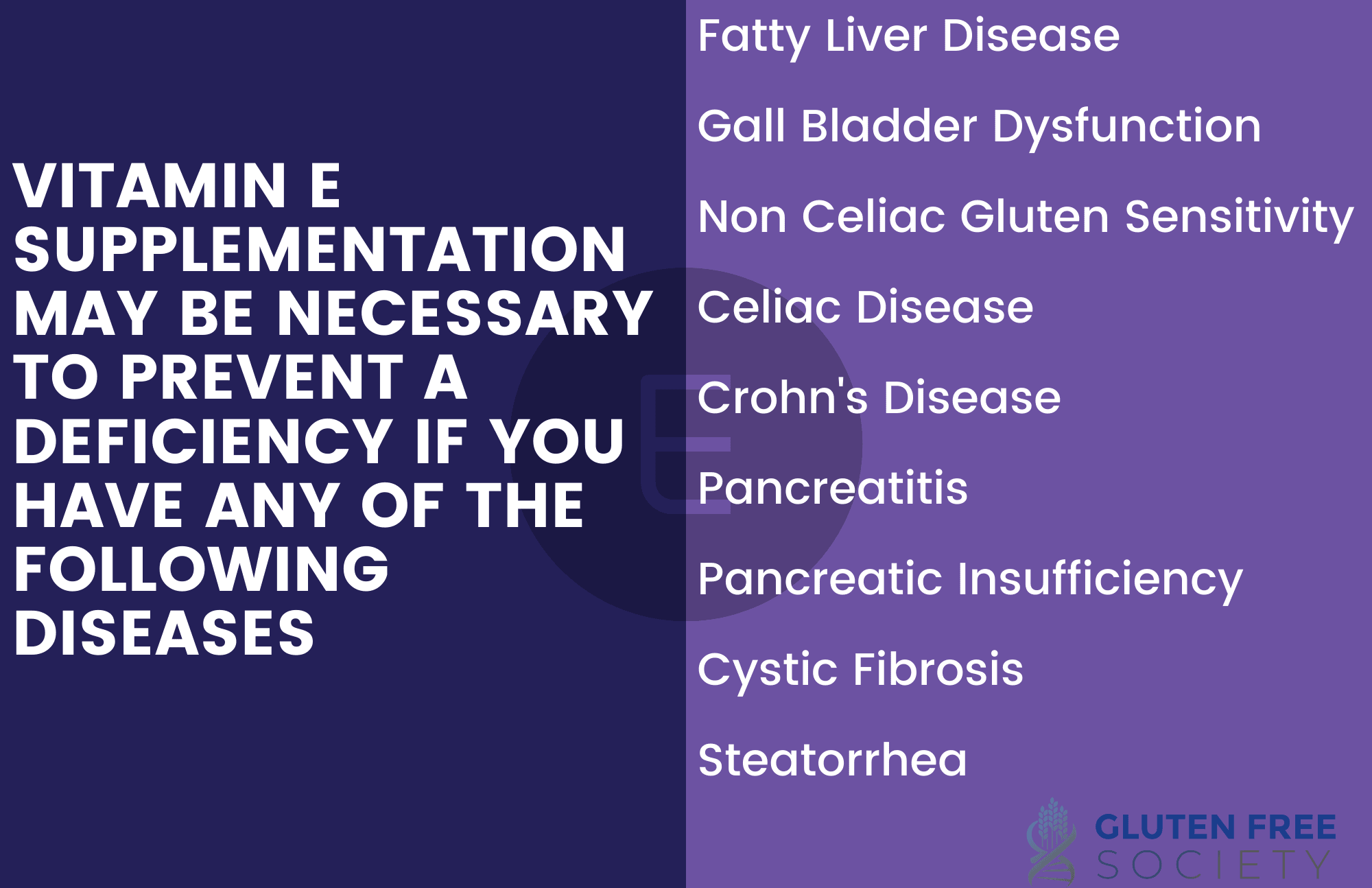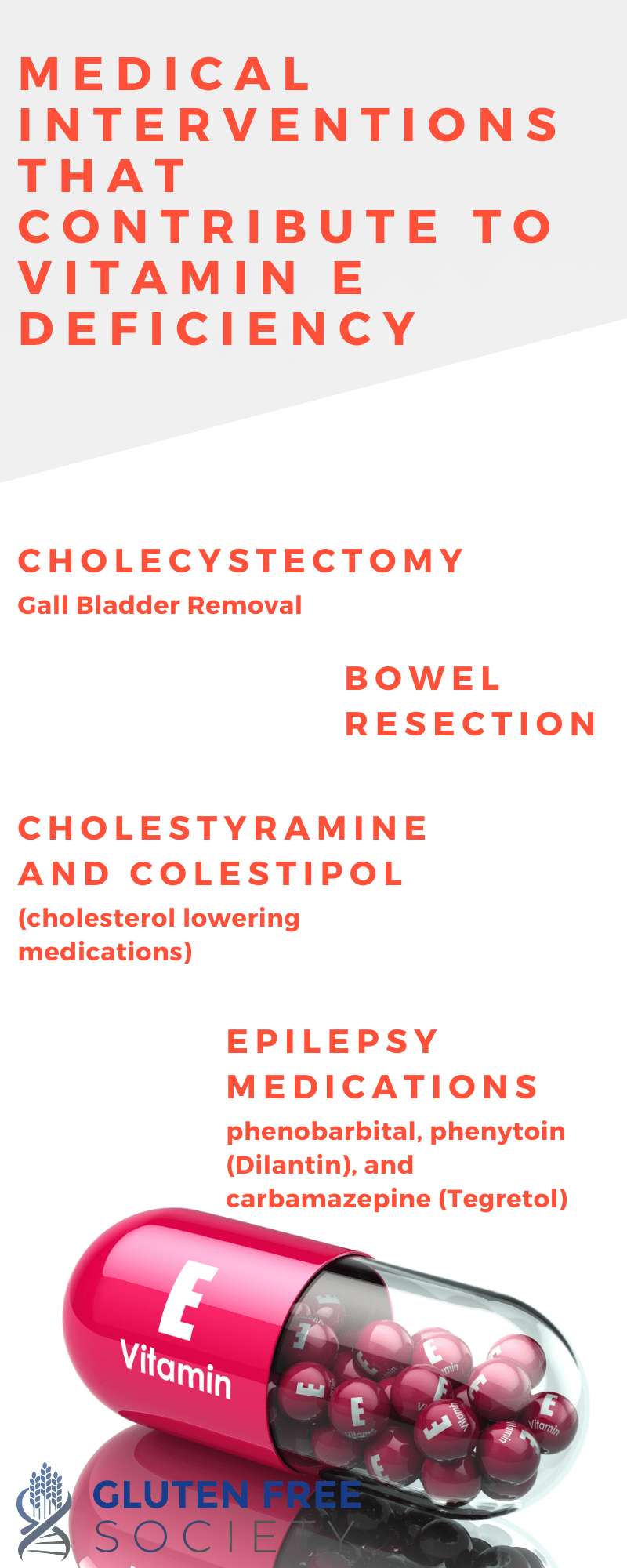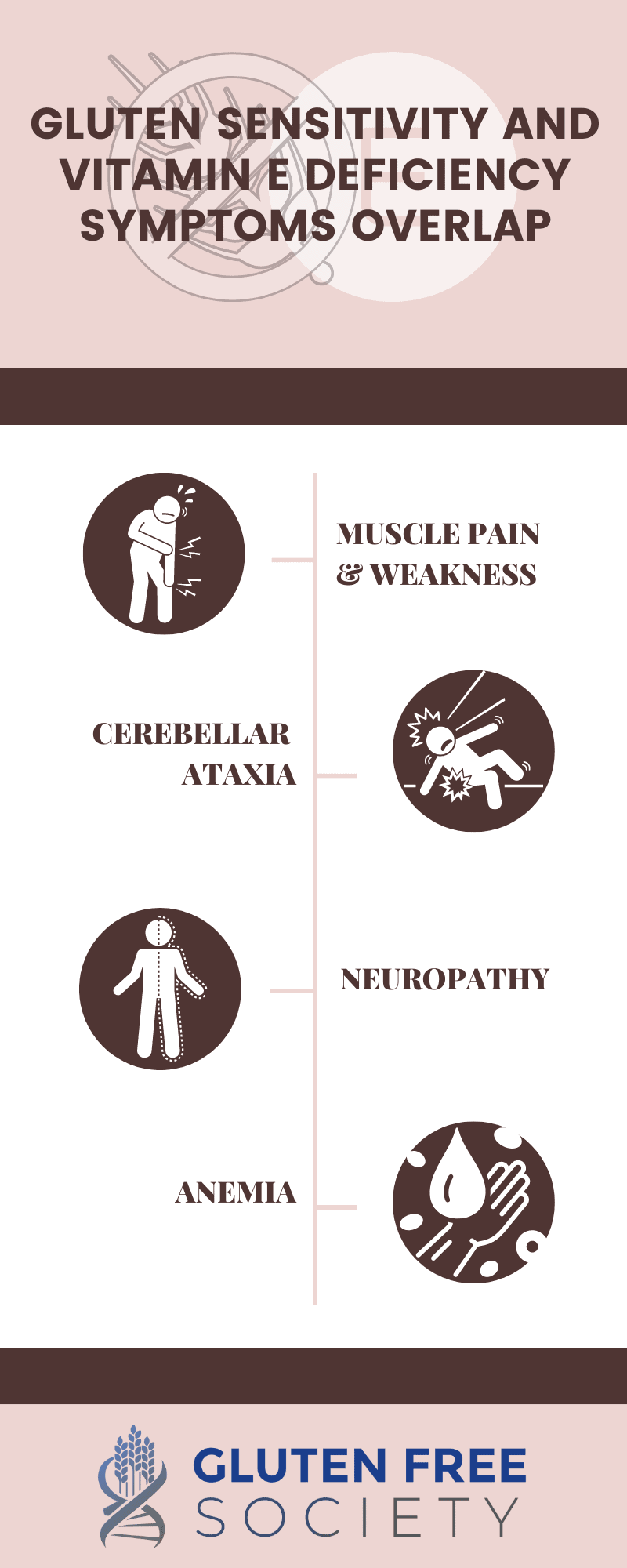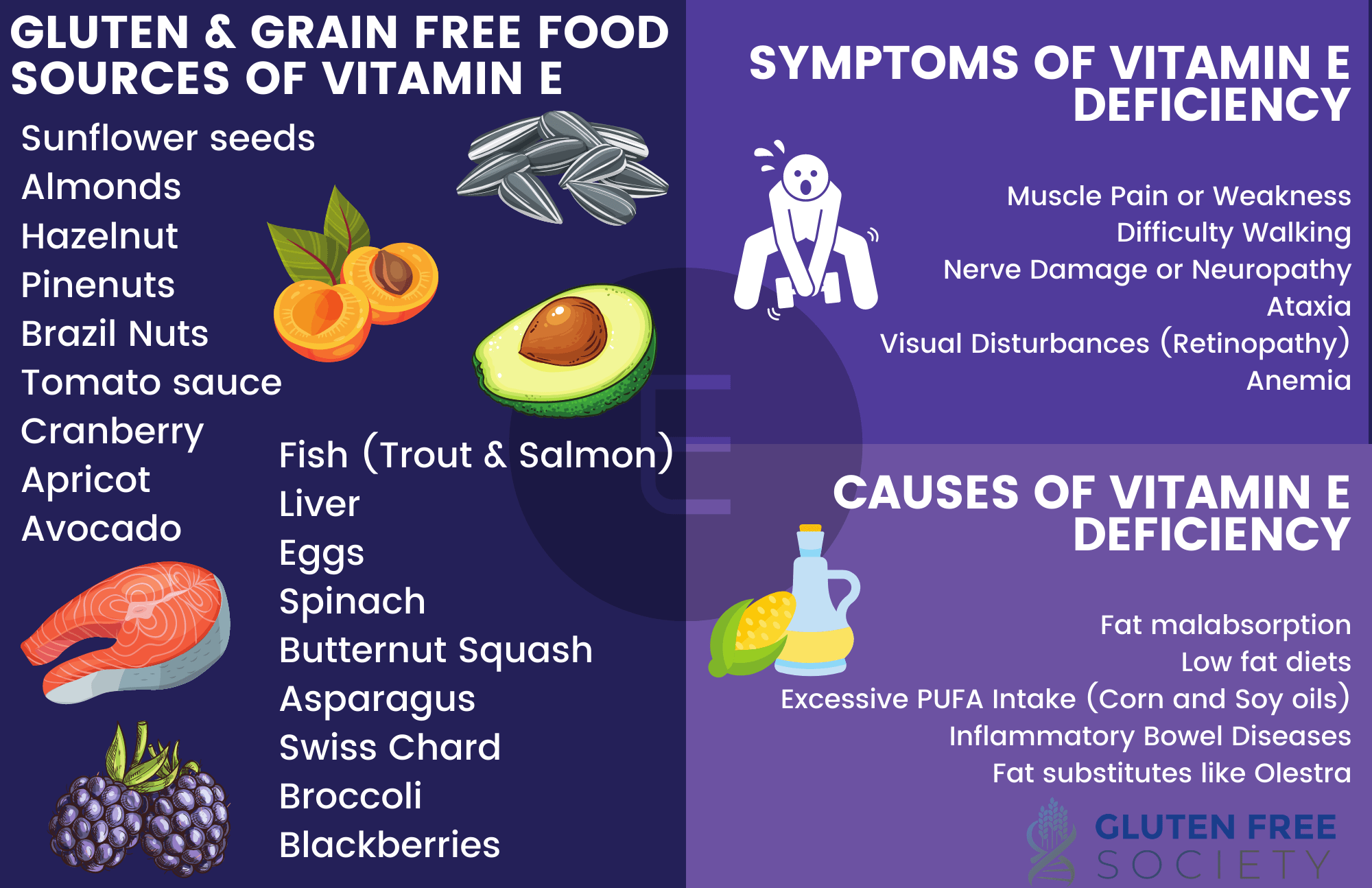Gluten and Vitamin E
Can gluten cause vitamin E deficiency? Do those with celiac disease benefit from vitamin E supplementation? These questions and many others will be answered below, but first let’s discuss what vitamin E is, and why it is so important.
Vitamin E isn’t a single nutrient. It’s a term used to describe a group of compounds with similar properties. Vitamin E compounds are broken down into tocopherols and tocotrienols. Maybe you’ve head of alpha-tocopherol. It’s one form of vitamin E. But there are 7 more found in nature that our bodies benefit from. These are beta, gamma, and delta tocopherol as well as alpha, beta, gamma, and delta tocotrienols. For simplicity’s sake, we will refer to this family of compounds as vitamin E.
Vitamin E is made by plants and are often (but not always) found in fatty foods. This is helpful to humans because vitamin E is a fat-soluble nutrient. This means vitamin E must be eaten with fat in order for it to be absorbed. It also means that vitamin E can be stored in your fat tissue for use when needed.
The Key Roles of Vitamin E
The vitamin E is known most for its powerful antioxidant properties. Essentially, vitamin E protects your cells from free radical damage.
Research shows that alpha-tocopherols reduce the production of free radicals. And gamma-tocopherols stop existing free radicals from damaging your cells. This helps keep your cells healthy and functioning properly, which is necessary to prevent disease.
For example, vitamin E’s ability to neutralize free radicals is what protects your DNA from damage that can cause mutations and lead to the development of cancer.
In addition to its antioxidant properties, vitamin E helps prevent disease by fighting against inflammation. Vitamin E is also well-known for its ability to prevent blood clots from forming that can otherwise lead to heart disease.
Other diseases that vitamin E has been shown to help reduce the risk of include cataracts and Alzheimer’s disease. Plus, vitamin E helps boost your body’s immune response, especially when dealing with infectious diseases.
Vitamin E Deficiency
Vitamin E deficiency is something we need consider during these modern times. Because the heavily processed foods we’re consuming don’t contain sufficient amounts of vitamin E. And we’re constantly stressed out, which affects our digestion and increases our nutritional needs. Additionally, popular diet trends like the low fat diet contribute to a lack of vitamin E.
On a similar note, vitamin E deficiency can be caused by diseases that impact our digestion of fat. For proper absorption of vitamin E, the liver, gallbladder, pancreas, and small intestine are essential to produce bile and enzymes which aid in this process. So it is important to understand that those with liver damage, gall bladder disease (including those who have had their gallbladder removed), pancreatic insufficiency, and inflammatory bowel diseases are at highest risk for developing a vitamin E deficiency. This includes gluten induced celiac disease. The diagram below illustrates a list of diseases that not only contribute to vitamin E deficiency, but these diseases may also require supplemental doses of vitamin E.

Medical Treatment That Can Cause Vitamin E Deficiency
It is also important to understand that some medical interventions, surgeries, and treatments can cause or contribute to an increased risk for vitamin E deficiency. These include:
- Surgical removal of the gallbladder (cholecystectomy)
- Bowel resection surgery – commonly performed on those with uncontrolled inflammatory bowel disease.
- Chronic use of NSAIDS – these medications can damage the intestine
- Cholesterol lowering medications
- Epilepsy or seizure medications (See the diagram below for more details)

Symptoms of Vitamin E Deficiency
Because vitamin E is a powerful antioxidant, low levels can lead to chronic inflammation and free radical damage. Inflammation can cause a wide array of different symptoms, so sometimes pinpointing their relationship to low vitamin E can be difficult. That being said, some of the more common symptoms associated with vitamin E deficiencies include:
- Vision impairment
- Muscle weakness
- Numbness
- Poor muscle coordination
- Lack of balance
If left untreated, a vitamin E deficiency can lead to abnormalities and may contribute to more serious diseases. These include:
- Heart disease
- Anemia
- Neuromuscular disorders – myopathy and ataxia (AKA – muscle and nerve damage)
- Blindness
- Male infertility
Can Gluten Cause Vitamin E Deficiency?
In addition to our Western diet that lacks vitamin E, the potential for problems increases when gluten sensitivity is added to the mix. Because in these cases, gluten irritates and inflames the GI tract, liver, and gallbladder, all of which are responsible for aiding digestion and absorption. Thus, food and the nutrients they contain (including vitamin E) are not properly digested or absorbed.
Diarrhea is a common symptom associated with gluten sensitivity. Chronic diarrhea may flush nutrients from your body before they have the chance to be absorbed.
Steatorrhea, a condition in which excessive fat is present in the stool due to malabsorption is also a common problem caused by celiac disease linked to low levels of vitamin E.
In this study, vitamin E levels were evaluated and compared between patients recently diagnosed with celiac disease, existing celiac patients not following a strict gluten-free diet, celiac patients strictly adhering to a gluten-free diet, and a healthy control group.
All patients with celiac disease had significantly lower levels of vitamin E than those in the control group. However, among those with celiac disease, the group that was recently diagnosed had the lowest levels of vitamin E. And the group following a strict gluten-free diet had the highest levels.
In this case report, doctors studied a woman with both celiac disease and cerebellar syndrome. Cerebellar syndrome occurs when your cerebellum in your brain is damaged or inflamed. It generally affects your gait and muscle coordination.
Despite being on a gluten-free diet, her cerebellar symptoms persisted. It was then determined that the woman’s vitamin E levels were low. So her doctors added vitamin E supplementation to her treatment plan, which helped reduce her cerebellar symptoms.
Similarly, in this case study, a patient diagnosed with celiac disease was also having neurological problems, including muscle weakness, nerve damage, and cerebellar symptoms. Doctors found inflammation in her muscle tissue and a severe vitamin E deficiency. When treated with a gluten-free diet and vitamin E supplementation, her condition significantly improved, including a reduction in muscular inflammation.
It’s also worth noting that in order for vitamin E to work effectively and efficiently, it requires the presence of other nutrients, such as vitamin C, vitamin B3, and selenium. Thus, gluten sensitivity may hinder the activity of vitamin E since it can also cause deficiencies in these supporting nutrients.
Gluten Induced Symptoms & Vitamin E Deficiency
Gluten can cause an array of symptoms that can overlap with the symptoms of vitamin E deficiency. It is important to understand the cross over, because if you have gone gluten free but still struggle with these symptoms, you may have a vitamin E deficiency issue that needs to be addressed. These overlapping symptoms can include muscle pain and weakness, cerebellar ataxia, neuropathy, and anemia.

Best Food Sources of Vitamin E
Vitamin E supplementation may be needed, especially if you’ve been recently diagnosed with gluten sensitivity or celiac disease. And it’s important to choose one that contains a mix of tocopherols and not just alpha-tocopherol. Because as I mentioned above, they all work together to protect your cells and promote health.
When it comes to food sources of vitamin E, they naturally contain multiple forms of the nutrient. So I also recommend including the following gluten and grain free, vitamin E-rich foods in your diet.
- Sunflower seeds
- Almonds
- Hazelnuts
- Pine nuts
- Brazil nuts
- Tomato sauce
- Cranberry
- Apricot
- Avocado and virgin avocado oil
- Olives and virgin olive oil
- Wild salmon and trout
- Liver
- Eggs
- Leafy greens (e.g., spinach, chard, kale)
- Butternut Squash
- Asparagus
- Broccoli
- Blackberries

The fruits and vegetables listed above should always be eaten with a source of healthy fat to boost the absorption of vitamin E. For example, roast your asparagus or broccoli with avocado oil. Sprinkle some coconut flakes on top of your kiwi.
Now, it is true that “vegetable” oils (e.g., sunflower and safflower) contain vitamin E. But these oils are heavily processed. They’re exposed to heat, pressure, and oxygen during the process, which damages the fat. When consumed, these damaged fats can harm your cells. Plus, these oils are high in omega-6 fatty acids, which promote inflammation when consumed in excess. So even though vegetable oils do contain vitamin E, I never recommend them.
Gluten Free Recipes Rich in Vitamin E
Now if you’re ready to add more vitamin E to your diet, below are a few of my favorite recipes with vitamin E-rich foods (and healthy fats) to get you started:
Always looking out for you,
Dr. O – The Gluten Free Warrior
Don’t be a stranger, leave me a comment!
The post Can Gluten Cause Vitamin E Deficiency? appeared first on Gluten-Free Society.
Never give up in life they all said there is no cure for HIV VIRUS, which is a big lie I have passed through many processes. Also, I never believed there is really a cure to HIV/AIDS until I met Dr. James. The doctor that have been helping people for many years, I come across this doctor online when I was searching for HIV permanent cure online I found out about Dr. James, and to my greatest surprise Dr. James has the herbal medicine for HIV cure which I have been looking for years I explained my problems to him through the email I found on someone who testified about Dr.James herbal mix write me a reply and explain how the process work so after ordering for the medicine I got it within 4 days and I took it according to the way Dr.James instructed me, I was very happy after 21 days I took the medicine there was very big change in my health when I was done with the process I went for a test, I found out I am negative that was the day I have the tears of joy after all i have been through.you can also get in contact with my doctor through his email now Drjamesherbalmix@gmail.com And He also has herbs medicine to cured the following diseases; Nephrotic Syndrome, eczema, urethra wart, chronic problems. Herpes, Cancer, ALS, Autism,Hepatitis, Diabetes, HPV infections,Hives,shingles,blistering, ulcer,Painful or Irregular Menstruation. HIV/Aids. Diabetics. Vaginal Infections. Vaginal Discharge. Itching Of the Private Part. Breast Infection. Discharge from Breast. Breast Pain & Itching. Lower Abdominal Pain. No Periods or Periods Suddenly Stop. Women Sexual Problems. High Blood Pressure Chronic Disease. Pain during Sex inside the Pelvis. Pain during Urination. Pelvic Inflammatory Disease, (PID). Dripping Of Sperm from the Vagina As Well As for Low sperm count. Parkinson disease. Lupus. Cancer. Tuberculosis. Zero sperm count. Asthma. Quick Ejaculation. Gallstone, Premature Ejaculation. Herpes. Joint Pain. Stroke. Weak Erection. Erysipelas, Typhoid, Discharge from Penis. HPV. Hepatitis A and B. STD. Staphylococcus + Gonorrhea + Syphilis. Heart Disease. Pile-Hemorrhoid.rheumatism, thyroid, Waist & Back Pain.Perioral dermatitis, Male Infertility and Female Infertility. Etc. Take Action Now. contact him & Order for your Natural Herbal Medicine: and email him
ReplyDeleteEmail...drjamesherbalmix@gmail.com